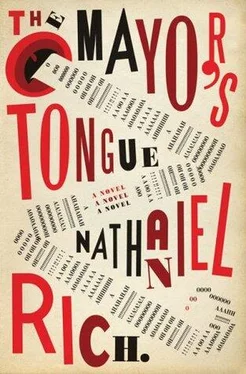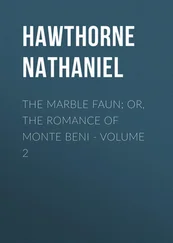"Did you ever tell her? Or did she die not knowing?"
"The last time I saw her I was fourteen. She was ninety-seven but still alert. The first thing she asked me was if we were still selling Keds. I said yes, of course, they were flying off the shelves. I knew no one had ever told her the truth about the store, but just the same I was taken aback. I wondered whether, on some level, she knew what had happened. She wasn't senile, after all, just old. She didn't die for another few years — she was one hundred and one."
"So it worked? The lie?"
"I suppose so."
"I have a pair of Keds."
"Oh yeah? What kind?"
"Well," she said, looking down, "they're powder blue, with beige rubber soles, rounded at the toes. ."
Eugene noticed her sneakers beneath the desk.
". . and spotless white laces."
"Exactly," she said.
A steady wind was blowing off the river now; it whistled through the old building's air vents like a muted scream.
"Check that out," said Sonia, pointing outside. Framed by the window, in the overcast sky, a half-moon glowed a bilious green hue. A thin white frill of cloud skidded across it.
"I've never seen anything like it," said Eugene. His chest was swollen, felt like it was going to explode.
"It's just strange is all," she said, crossing her arms over her chest. "I need to go home. You can walk me to a cab, if you like." She got up abruptly, her hair whipping over her eyes.
They walked to Broadway and Eugene hailed her a taxi. Sonia gave him a weak handshake. Eugene was desperately certain that he had bored her into leaving.
"I'll see you soon?" She said it in a tone that seemed to signify to Eugene the opposite. "Maybe before I leave."
"I hope so," said Eugene. With a curious, sideways glance, Sonia slunk into the taxicab. Eugene could tell that, behind the dark backseat window, she was still looking at him. He wondered if she would ever look at him that way, or any way, again.
Although they rarely speak in bed, it's there that Mr. Schmitz has his most profound interactions with his wife. These are not of a sexual nature, although for Mr. Schmitz, they are passionate. During the moments just after Agnes falls asleep, the semidarkness has a strange tendency to transform some physical detail into the shape of an old memory. A lock of hair, brittle and white by day, morphs into a healthy blond curl, bobbing as it did under the klieg lights of the football field at Lancaster County High School, where Agnes had been a cheerleader and he the editor of the school newspaper. Her lips, in a certain sleepy pose, remind Mr. Schmitz of the mischievous look that used to come over her face when she wanted to be kissed — like on their tenth wedding anniversary, on the boardwalk in Atlantic City, when she leaned against his chest to escape the spray of the crashing surf. But the detail that strikes him most devastatingly is her fist. When she has bad dreams, she balls up her hands, and Mr. Schmitz remembers something she wrote him in a letter that summer of 1944—the summer he met Rutherford.
Both men were stationed in Udine in the final year of the war, operating out of the Campoformido Airfield. Mr. Schmitz served as a runner, charged with sprinting up and down the line of command with encoded messages. Rutherford, a pilot, was greatly admired in camp for his garrulous wit, ribald storytelling, and most of all, his cooking — even though the scant provisions provided to the soldiers (cheese bars, ten varieties of canned meat, and something called "soluble cream product") presented few opportunities for him to display the culinary expertise he had acquired working in his uncle's Mulberry Street restaurant. When the men grew dizzy from hunger and malnutrition, and could eat no more variations of canned meat, they pleaded with Rutherford to describe his favorite dishes. So as the men spooned out clumps of Irish stew, he would explain to them the exact method for whisking eggs for a frittata, simmering onions for a Genovese sauce, or stuffing squid with breadcrumbs, parsley, and garlic to make calamari ripieni. The men would swallow their military rations with smiles and closed eyes, dreaming that they were digesting venison instead of waterlogged beef, bistecca alla fiorentina instead of preserved lamb chunks.
Mr. Schmitz, then Private Schmitz, was not nearly as portly in those days, though his hips were still wide enough to prevent him from squeezing into the cockpit of an Avenger or a Mustang. So during the day, while the fighter pilots flew drills overhead and left on surveying missions, he would stay behind in the camp, supervising the flight log and decoding signals sent by telegraph. The pilots — the camp's leaders and larger personalities — tended to ignore him. If he laughed at a joke during dinner, they would stare at him crossly, until he shifted his seat farther from the campfire, receding into the shadows where he couldn't be seen. Rutherford didn't pay him any attention either. Most of the time Rutherford was surrounded by a cordon of his comrades, regaling them with lascivious stories, recipes, and anecdotes about his freewheeling youth on the Lower East Side; otherwise he retired into his tent with books sent to him by one of his girlfriends from New York. Private Schmitz suspected that Rutherford got all his stories from these books. He once even sneaked inside Rutherford's tent to gather evidence, so that he could expose the phony chef and get his revenge. But he was shocked to discover that the books were not the dimestore novels he and the others occasionally leafed through. Instead, there were scholarly books on the history of art, a philosophical treatise on Epicureanism, a worn edition of The Canterbury Tales , and an Italian grammar textbook. Private Schmitz never mentioned his discovery, but he was no longer angered by Rutherford, only puzzled.
One week, when the division was in Trieste on a supply run, a ship carrying fresh produce from Split capsized in the Adriatic Sea, just several hundred yards from shore. The captain and his small crew waved distress flags, as the boat tilted and slowly plunged. The port's starving deckhands and unemployed sailors took off in rafts for the sinking ship. As soon as their ravenous, sallow faces came into view, the ship's captain and his crew threw down their distress flags and jumped overboard, swimming wildly to shore.
When the starving men climbed aboard the sinking ship, the smell overtook them — a stench so acrid it made their eyes water. Below deck they found the source. There, illuminated by two twinkling oil lamps, was a low-ceilinged hold that stretched back the length of the ship. Thousands of heads of garlic filled the room, piled nearly two feet high. The men howled with rage, and in their despair, took out their guns. They fired into the garlic carpet, sending cloves flying like shrapnel, smashing against the walls, spraying their faces with the bitter juice. The rampage was interrupted by a yell behind them — it was Rutherford, running into the hold, begging them to stop. The garlic was valuable: didn't they know anything about Italian cooking? It could transform what food they had into something edible, maybe even tasty. Chastened, the men stopped firing, and backed away. Then, at the other end of the room, the garlic mass started shifting. A single flabby arm shot out, waving frantically. The men jumped at the sight.
"It's OK," shouted Rutherford. "You can come out now. We won't shoot."
But it wasn't one of the ship's crew.
"I thought," said Private Schmitz, "you were going to kuh-kuh-kill me."
As he straightened, garlic tumbled off of him, like boulders off a mountain. Rutherford and his men looked at him in disbelief. Crushed garlic flecked his chin and cheeks. He had been weeping, and his face was scarlet.
Читать дальше












